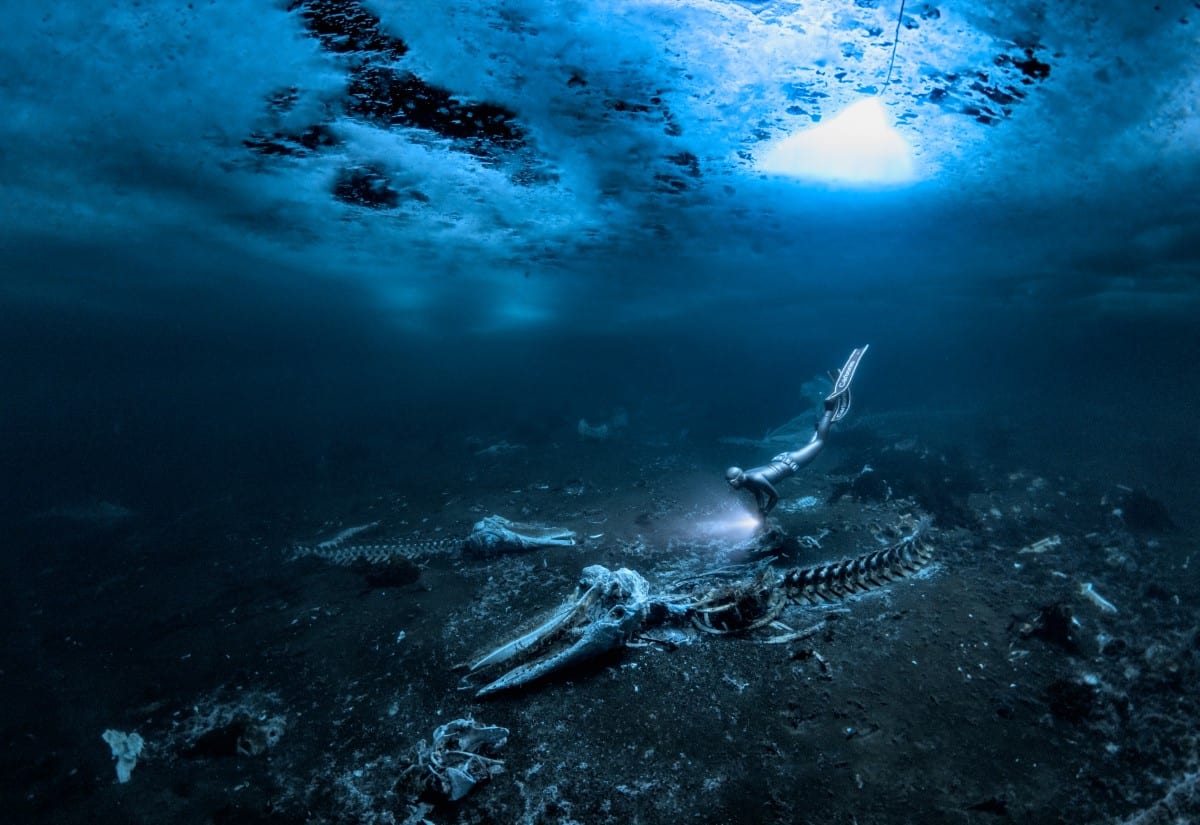
“Whale Bones” by Alex Dawson (Sweden). Underwater Photographer of the Year 2024 and Winner Wide Angle Category.
“In eastern Greenland, the local hunters bring their catch and share it with each other. From a stable population of over 100,000 minke whales in the North Atlantic, the hunters of Tasiilaq typically take less than a dozen. The whale is pulled up on the beach during high tide, and many families gather to cut the skin, blubber, and meat off at low tide. Almost all the whale is consumed, however the skeleton is pulled back into the sea by the next high tide and the remains can be found in shallow waters where various marine invertebrates and fish pick the bones clean.”
A haunting photo of a free diver coming upon the skeletal remains of a whale earned Sweden’s Alex Dawson the title of 2024 Underwater Photographer of the Year. This stark reminder of the effects of whaling beat out over 6,500 images taken by underwater photographers around the world to earn the top prize.
“Photographed in the toughest conditions, a breath-hold diver descends below the Greenland ice sheet to bear witness to slaughtered whales. The masterful composition invites me to consider our impact on the great creatures of this planet,” shares judging panel chair and acclaimed underwater photographer Alex Mustard.
“Since the rise of humans, wild animals have declined by 85%. Today, just 4% of mammals are wildlife; the remaining 96% are humans and our livestock. Our way needs to change to find a balance with nature.”
American photographer Lisa Stengel was named Up & Coming Underwater Photographer of the Year for her rare glimpse of a mahi mahi catching a sardine in the waters off of Mexico. Her ability to capture this decisive moment made the judges excited about her future in the field.
Dawson and Stengel’s images are just two of the worthy winners in the contest, with awards also given out across 12 other categories that include Behavior, Wide Angle, Wrecks, and Portrait. And, given that the contest is based in the UK, there are also several awards specifically for UK photographers or images shot in UK waters.
From concerned citizens pushing a sperm whale back out to sea to an adorable blenny peering out from a shell, the winning images help paint a complex picture of the ocean. In doing so, they help us understand a bit more about the challenges the aquatic world faces, as well as the magic of the world that lives below the surface.
Here are the winners of the 2024 Underwater Photographer of the Year competition.
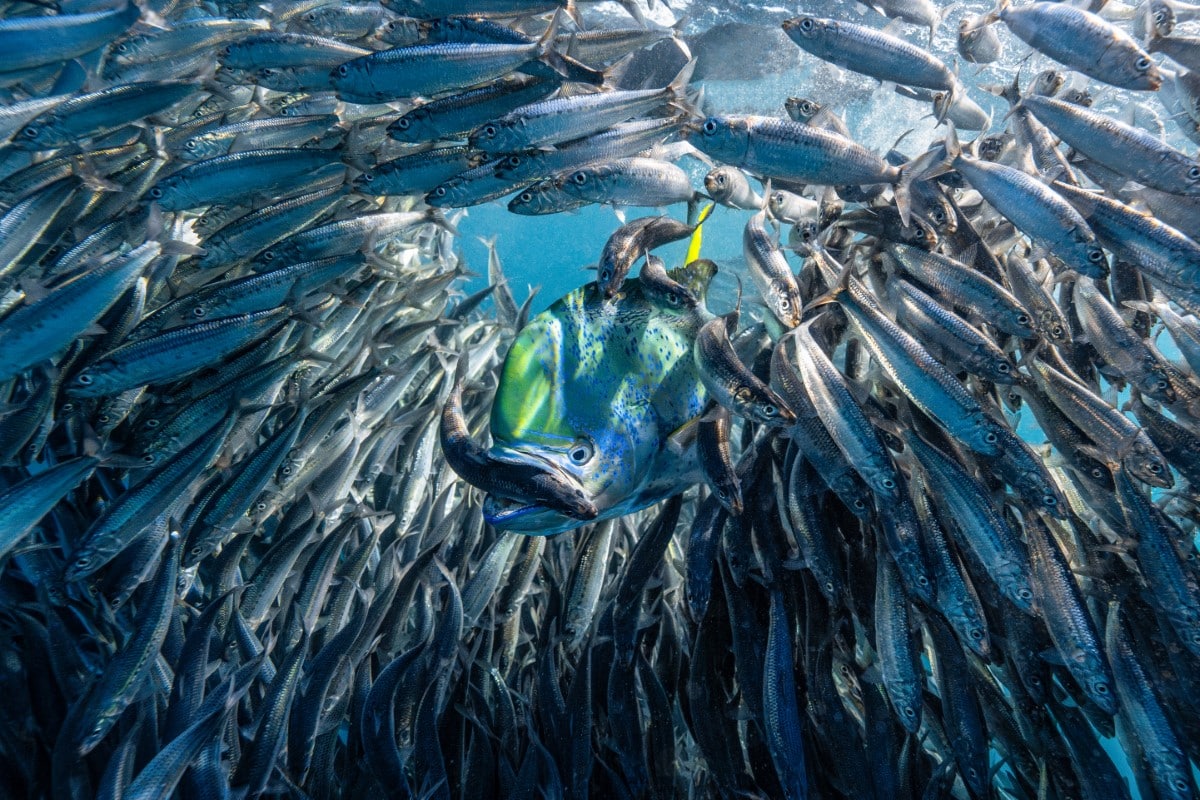
“Window of Opportunity” by Lisa Stengel (United States). Up & Coming Underwater Photographer of the Year 2024
“The moment of ambush amidst a blur of evasion! This photo captures the instant of the attack. We spent an exciting week looking for bait balls, which provided many opportunities. The season’s unique water temperatures kept the marlin farther from reach, but brought an interesting phenomenon: an unprecedented amount of mahi mahi. I chose not to wear a hood and noticed a distinct noise from the bait ball every time the mahi would attempt to hit a target. If you listen closely, there’s an enormous amount of sound in the ocean, especially surrounding bait balls. I honed in on the sound of mahi attacks and followed this unmistakeable sound with my camera. This technique, coupled with serendipitous conditions gave me the window of opportunity to capture this special moment.”
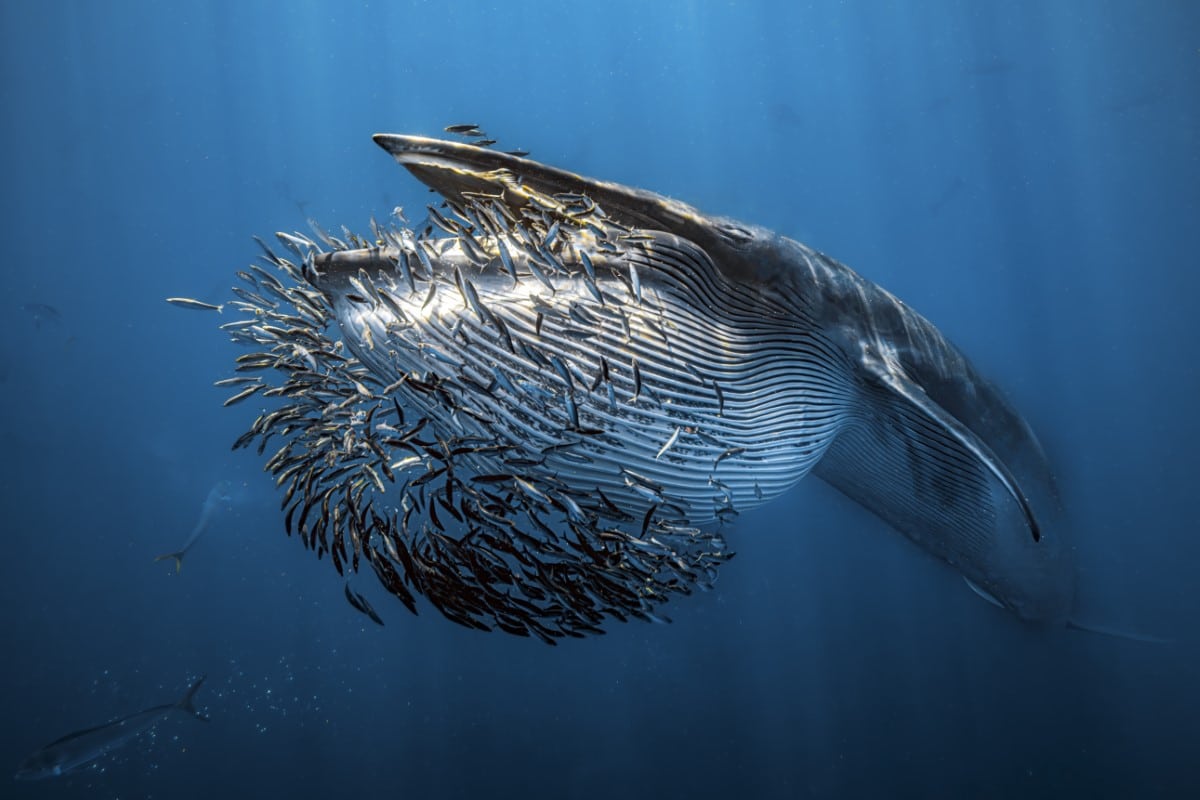
“The End Of The Baitball” by Rafael Fernandez Caballero (Spain). Winner Behavior Category
“I was fortunate enough to experience this unique spectacle in the open Pacific waters in Magdalena Bay at the end of 2023. Due to the warmer water this year caused by the climate phenomenon “El Niño,” more species than ever joined this hunt. Bait balls of sardines attracted a variety of predators, but the main stars of the show, visiting Baja in perhaps larger numbers than ever, were the Bryde’s whales. They patrolled the waters, searching for bait balls to get their bellies full of hundreds of kilograms of fish. This photo shows the very moment of attack, with the whale’s ventral pleats wide open and filtering the prey from the water using their baleens after engulfing hundreds of kilograms of sardines in one bite — simply unforgettable.”
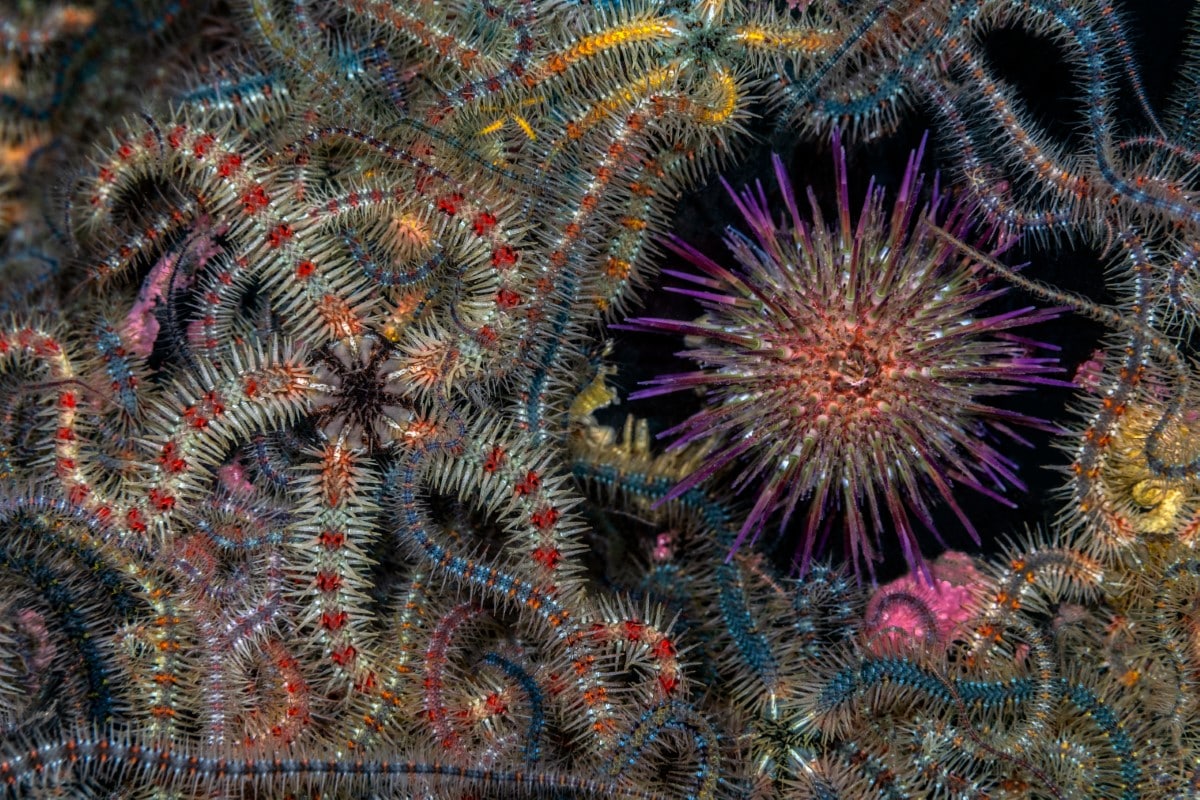
“Star Attraction” by Jenny Stock (United Kingdom). British Underwater Photographer of the Year 2024 and Winner British Waters Macro Category
“Loch Leven is a Scottish dive site near Oban that can be can easily be accessed via a lay-by on the A82. Once there, a walk down a steep leafy track will lead you into the ‘refreshing’ water. As I descended into the dark green depths of the sea loch on a dusk dive, I approached an area where my torch picked out the vivid colors of a living carpet of thousands of brittlestars.
Captivated by the variety of hues and patterns each star took, I felt this was an incredible encounter with a species I’d never seen before. I was happily snapping away when I spotted this purple sea urchin, and I got really excited. A dominant star next to this graphic invertebrate created a beautifully balanced pair, perfectly surrounded by an entanglement of the background brittlestars.”
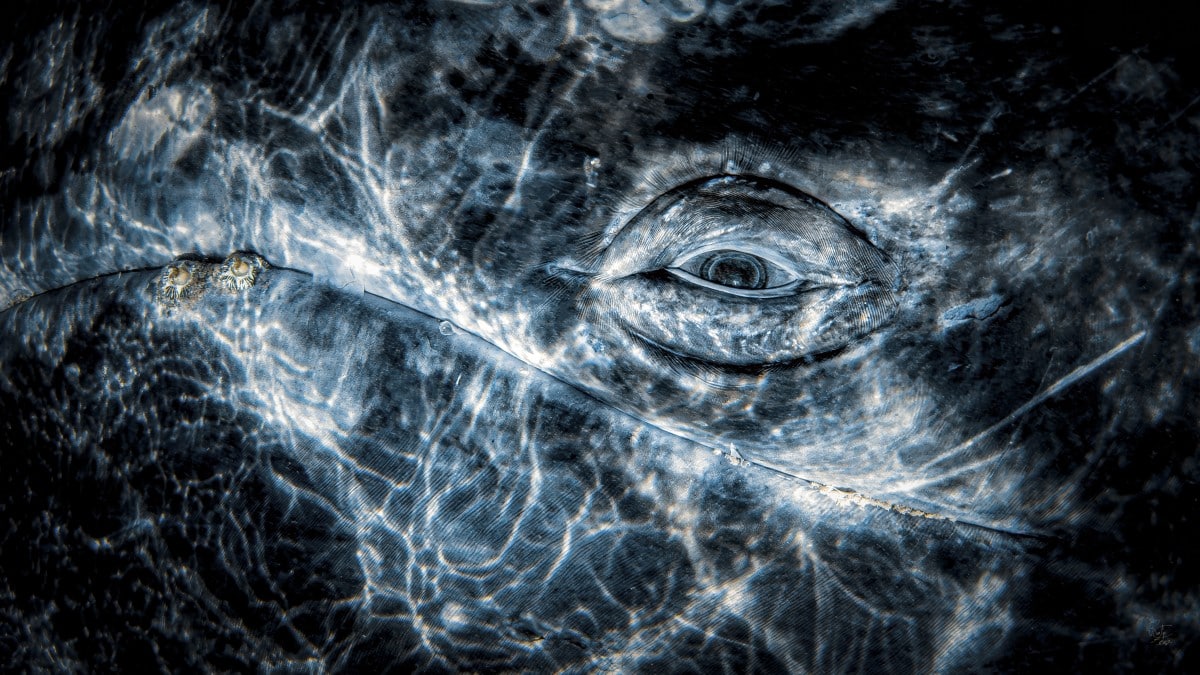
“Grey Whale Connection” by Rafael Fernandez Caballero (Spain). Winner Portrait Category
“Encounters with gray whales in Pacific saltwater lagoons are extremely special. Known for their friendly and curious nature, gray whales often approach boats, allowing observers to witness distinctive behaviors like spy-hopping. This photo was taken from the boat, where the whale displayed a friendly gaze toward my camera, resembling a human look of curiosity and innocence. During their migration from the Bering Sea to Baja California, these lagoons serve as crucial havens and winter maternity wards. With only around 1300 gray whales left, responsible practices of ecotourism are key to protecting these giants. These special moments highlight the beauty and intelligence of the whales, creating enduring memories for both observers and, surely, the curious whales themselves.”
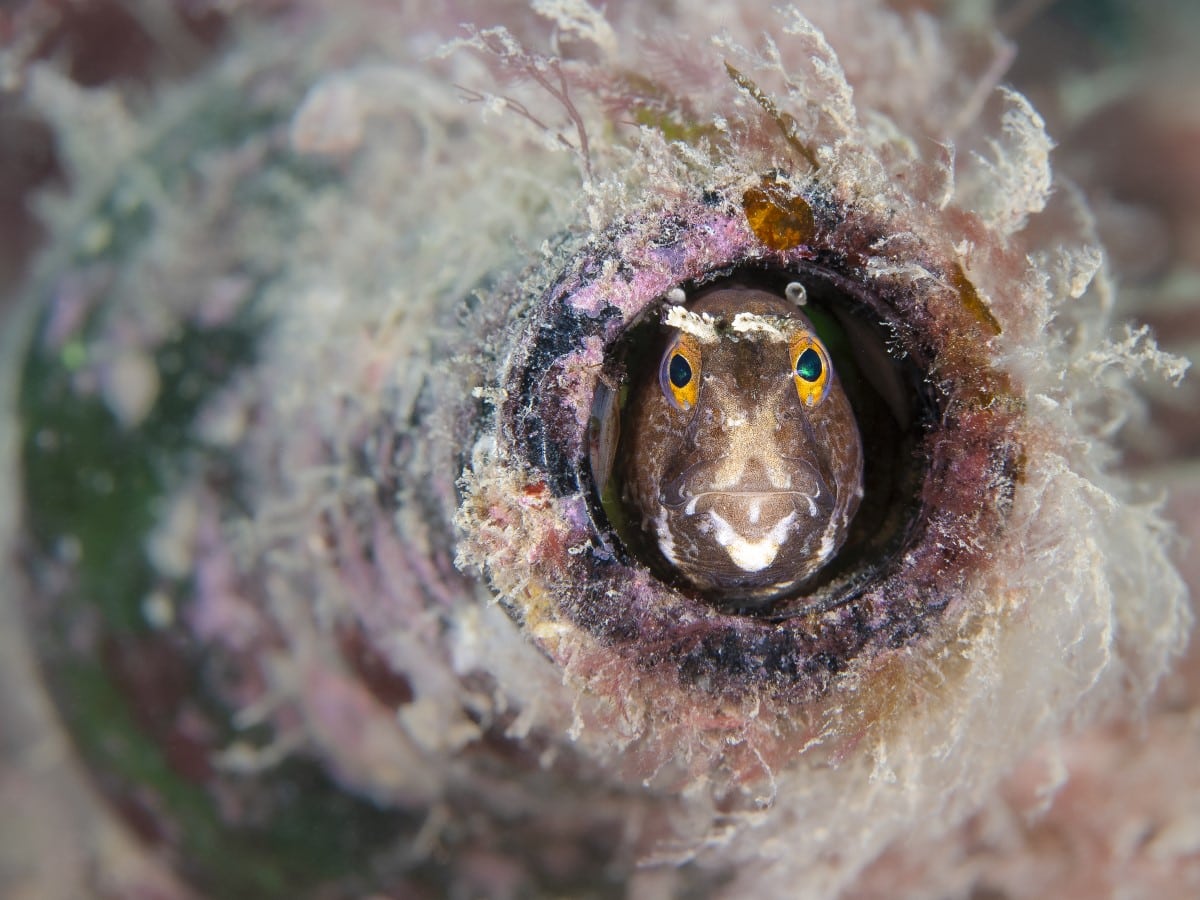
“Bottled blenny” by Kirsty Andrews (United Kingdom). Winner British Waters Living Together
“Butterfly blennies naturally choose abandoned whelk shells as their home, but it seems they can get creative. On the seabed of the river Fal, amongst beautiful pink maerl, many have chosen to use discarded glass bottles as a shelter. Waste not want not.”
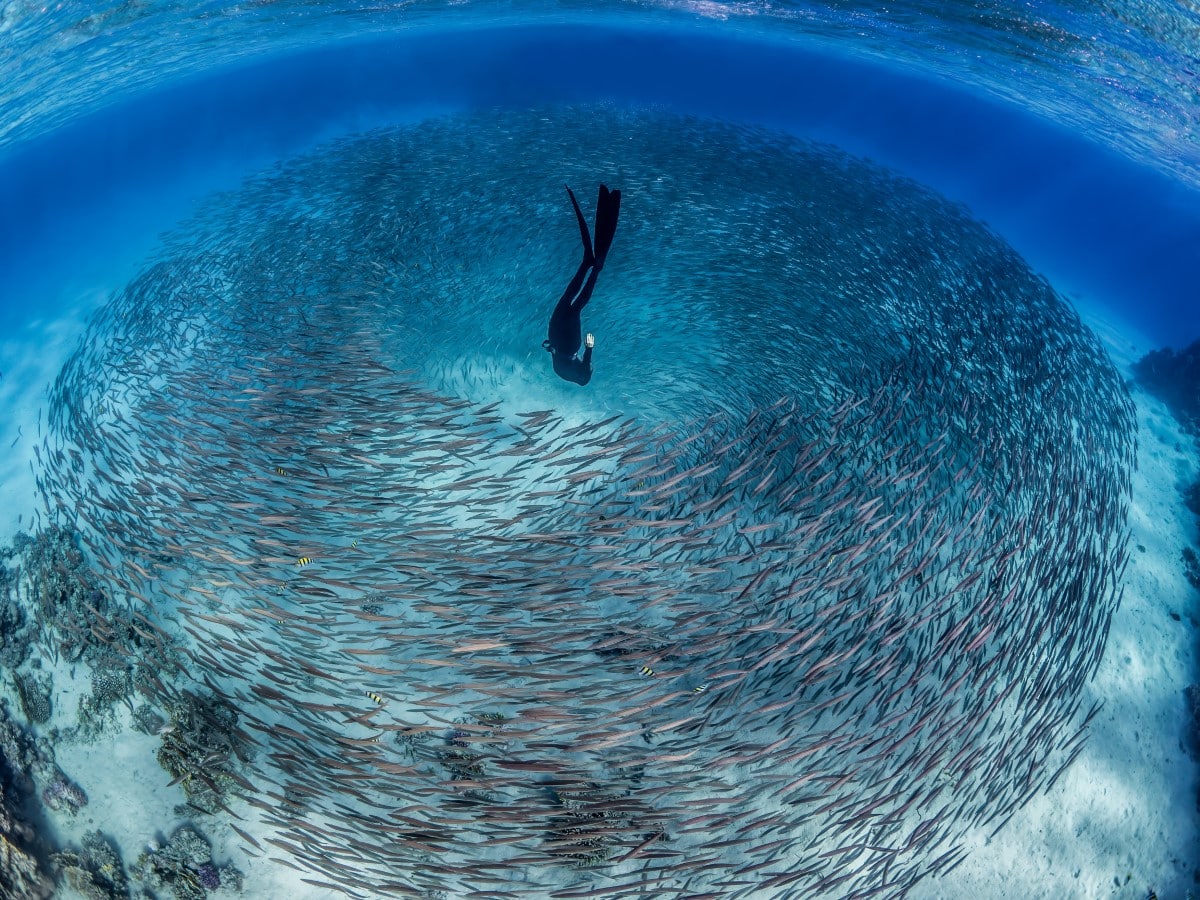
“Encircled” by Sarah O’Gorman (Egypt). Runner-up, Up & Coming Underwater Photographer of the Year
“Summer 2023 brought the usual small groups of baby barracudas to each coral pinnacle on the house reef at Marsa Shagra, but for the first time in the 11 years I have lived there, they all gradually came together as one giant bait ball in the entrance of the bay, giving divers no choice but to pass through them at the start and end of their dive. Snorkelers spent hours every day floating above them, mesmerized by their movements.
One particularly clear and quiet morning, I was able to witness and photograph this free diver as she played amongst them, influencing their formation for as long as her breath would last. As autumn passed, the juveniles grew, and the bait ball attracted hunters such as snappers, jacks, and bigger barracudas who feasted for several months, and by winter, it was as if it had never existed.”
Photographers compete in numerous categories, including several reserved for UK photographers.
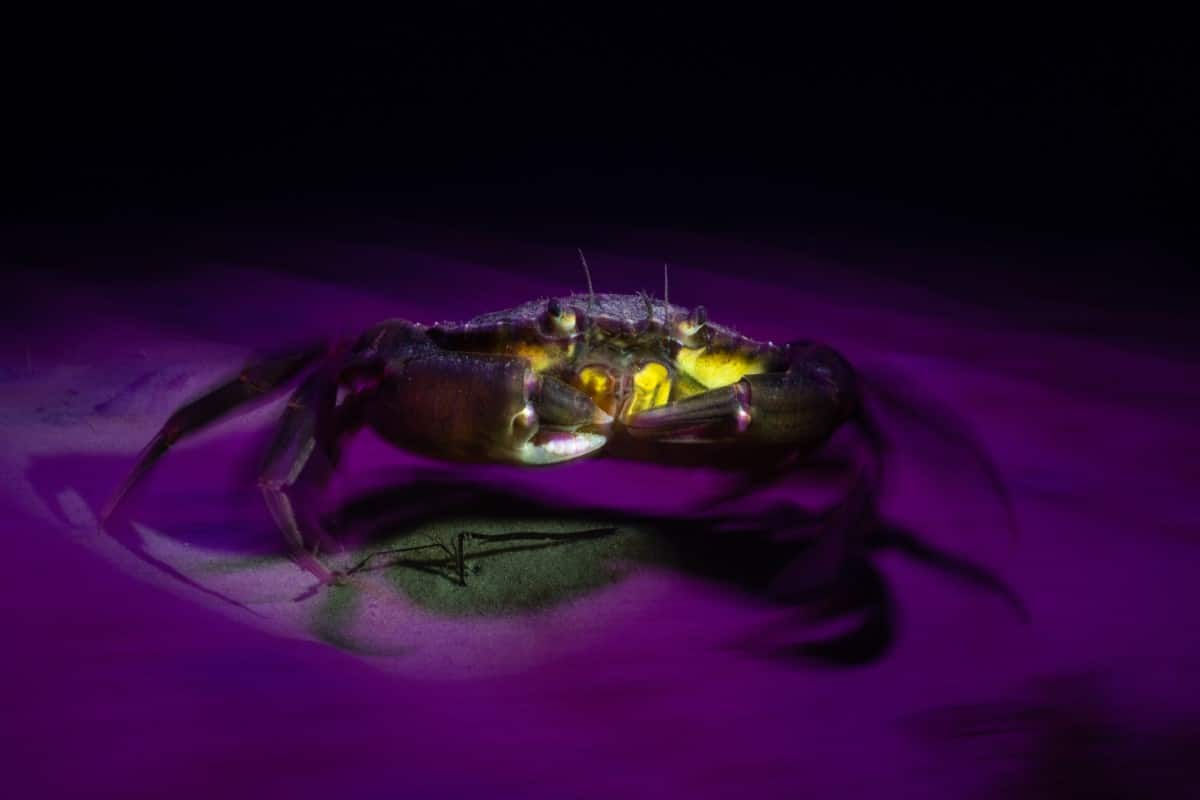
“Midnight Raver” by Sandra Stalker (United Kingdom). Most Promising British Underwater Photographer 2024 and Runner-up British Waters Macro Category
“I took this shot on a night dive at my local dive site. I had previously attempted this shot on a few dives and hadn’t quite achieved what I wanted until this dive. I find the crabs to have such bold and funny characters whilst running up to me and then away wildly flailing their legs like ravers, and I wanted to capture this character. The crab didn’t really stand out much from the sand, so I used a purple light on a torch for the background, and then I snorted the crab with white light on a strobe, tracking it as it ran across the seabed for the long exposure. This made a lovely contrast of the green of the crab against the purple with the crab looking directly at the camera.”
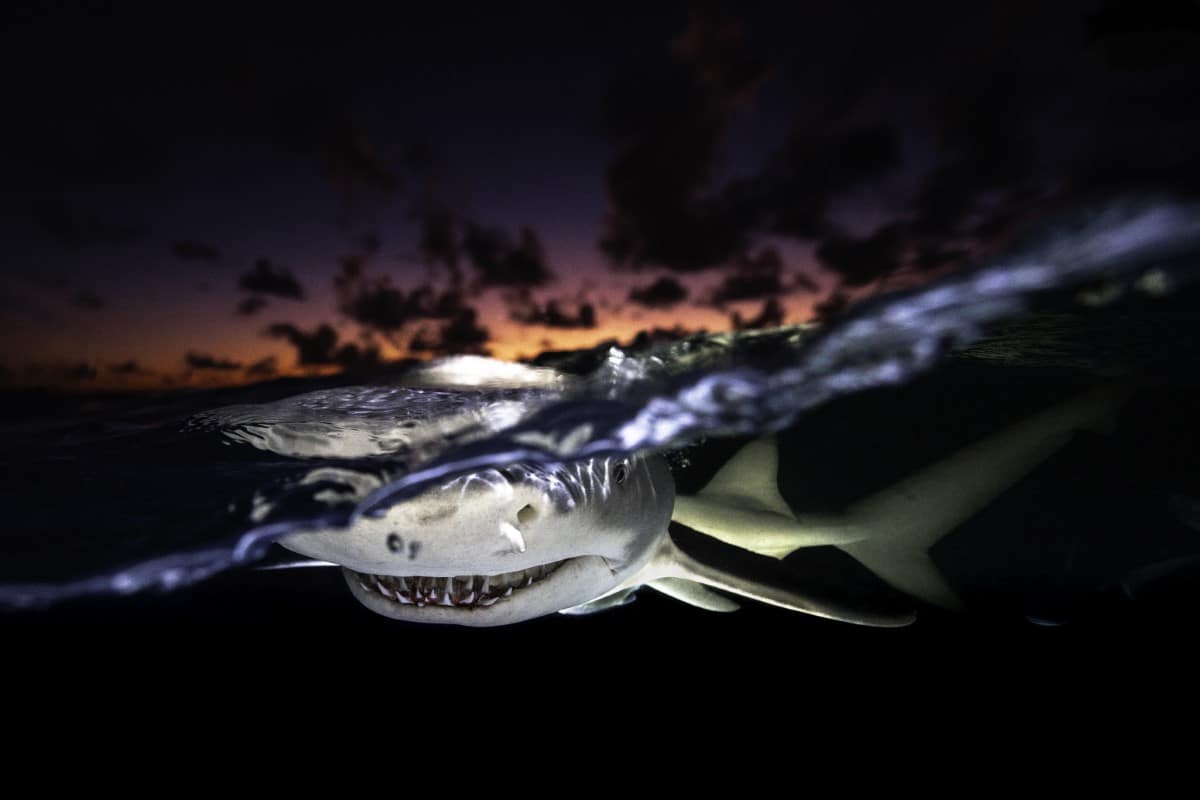
“Twilight smile” by Rodolphe Guignard (France). Third Place, Wide Angle Category
“In 2011, the Bahamas declared its waters a “shark sanctuary.” Off the island of Grand Bahama, I witnessed several unforgettable encounters. At dusk, several dozen lemon sharks rise from the depths and surround the dive boat. Perched on the swim step with my body half-submerged, I set out to take split shots. On this day, the sea was rough; it was almost dark, and the sharks were lively and very curious, not hesitating to come into contact with my housing! In these light conditions, I replaced my strobes with two headlamps to ensure continuous light. I used the burst mode coupled with a fast shutter speed to better freeze the movement. With a lot of patience and luck, I was able to capture some very close-up shots and highlight the magnificent colors of the sunset. A striking face-to-face encounter!!
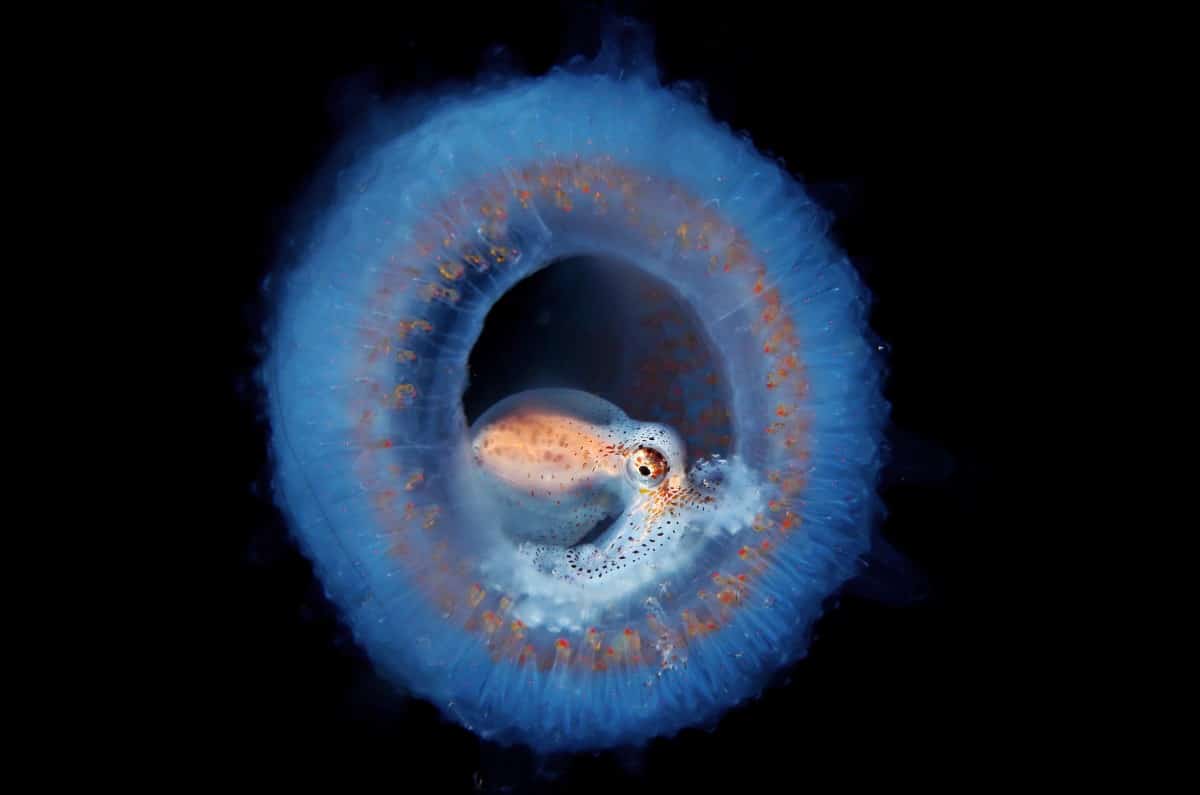
“Lonesome Drifter” by Dennis Corpuz. Runner-up Macro Category
“We frequently witness the vertical migration of small creatures that travel and feed on highly attractive lights in water that is approximately 200+ meters deep in blackwater. While I was exploring the area, I came across a pyrosome (an unusual tubular planktonic animal) that was 10cm (4 inches) long. As I examined it carefully, I discovered that an animal was hiding inside it. The creature was floating in mid-water and moving randomly. Luckily, I managed to capture a few shots of it before it drifted away into deeper waters.”
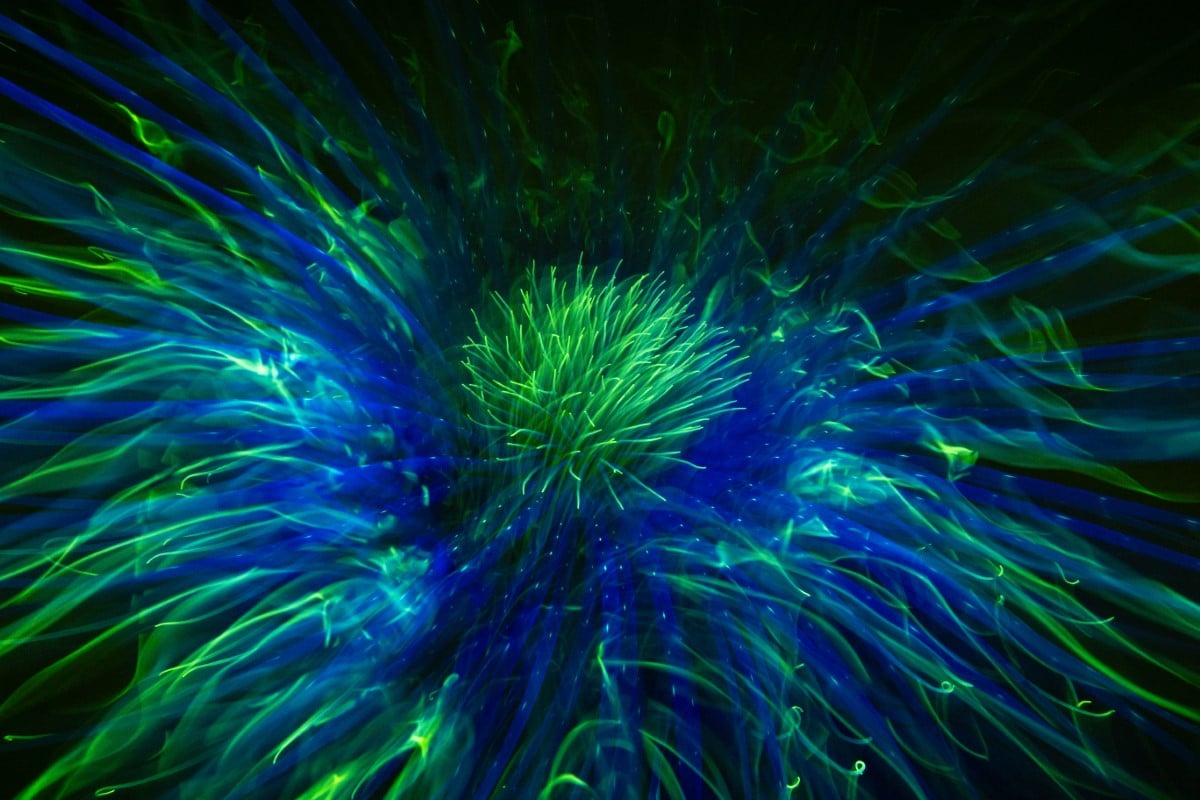
“Fluorescent Fire” by James Lynott (United Kingdom). Runner-up British Waters Compact Category
“I have experimented a little with shutter drag/motion blur photography in the past and have seen many incredible examples of this style from other underwater photographers. I had never seen this technique combined with underwater fluorescence, so this was something I was keen to start trying in 2023. I experimented with a range of subjects and soon discovered I really liked how fireworks anemones looked using this method, which was not really a surprise as they are my favorite fluoro subject! This shot was captured during a pre-sunrise dive in Loch Fyne back in October 2023, I used 2 Nightsea excitation filters on my strobes, together with FireDiveGear/Riff TL Azur blue LED lights, and a FireDiveGear barrier filter.”
Over 6,500 images from underwater photographers around the world were entered into the 2024 competition.
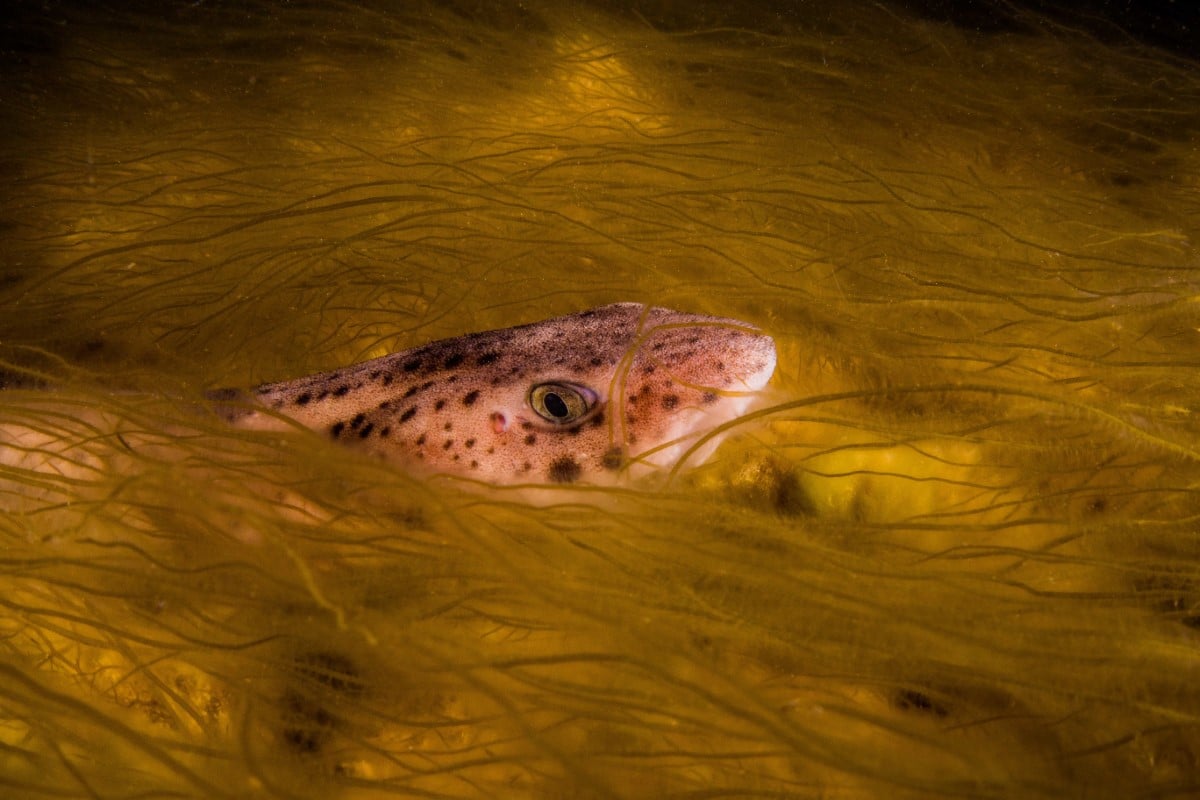
“Catshark in Bootlace” by Jon Bunker (United Kingdom). Winner British Waters Compact Category
“The bootlace weed can sometimes completely blanket the pebbles overlooking the reef at Chesil Cove in the summer. Scores of catshark, cuttles, young conger, and other nighttime predators patrol this seasonal ‘jungle’ slope, happy to snack on whatever comes their way. This sleepy catshark was, as you can see, unsure of what to make of me, poking its head tentatively through the weed to establish if I was either a threat or food. While it was considering this, I managed to play around with my strobes a little in an attempt to diffuse some of the light through the tresses of early summer algae. My subject let me take three shots before swimming off into the night.”
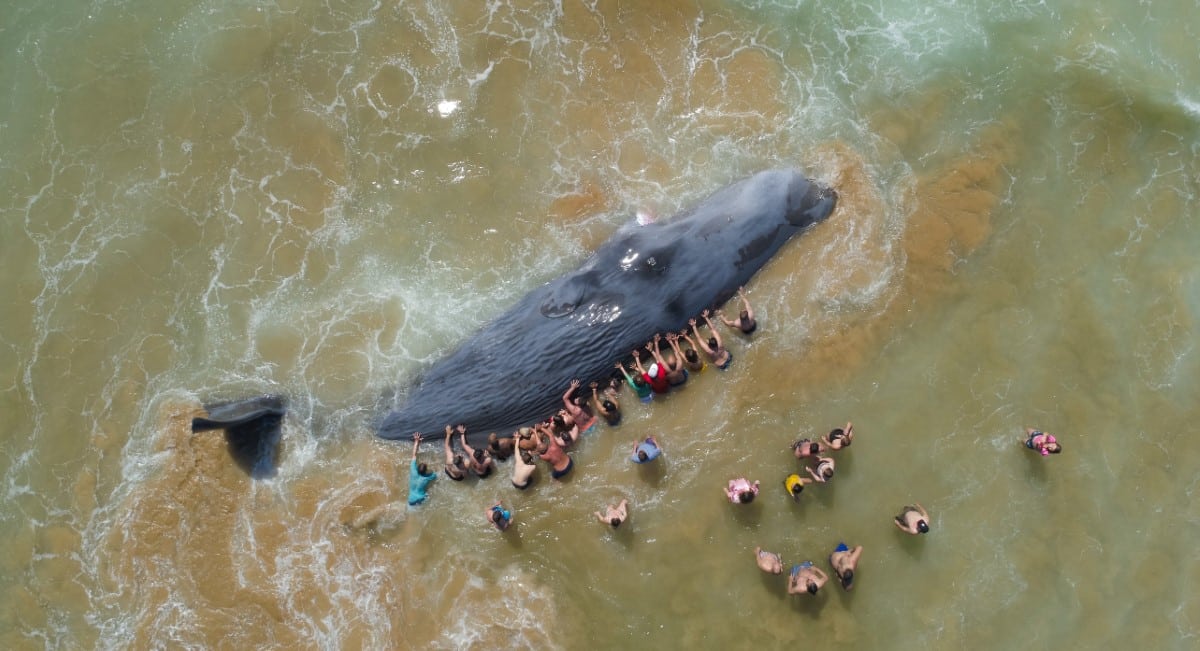
“Saving Goliath” by Nuno Sá (Portugal). ‘Save Our Seas Foundation’ Marine Conservation Photographer of the Year 2024
“The golden beaches of Costa da Caparica, just across the river from Lisbon, were packed with sun-seekers on this sunny day. And then something unusual caught their attention on the horizon. A massive sperm whale seemed to be struggling to swim as it slowly moved towards the coast. Soon, its giant wounded body was passing by surfers and swimmers and reaching the shallow waters of the beach. But suddenly, dozens of sun seekers start running towards the whale. Together, they push and chant, trying to help the giant back into the sea as it slowly slaps its tail back and forth and breathes heavily. Several hours later, the whale takes its last breath, its body crushed by gravity as it lays on the sand. An estimated 20,000 whales are killed every year, and many more injured, after being struck by ships-and few people even realize that it happens.”
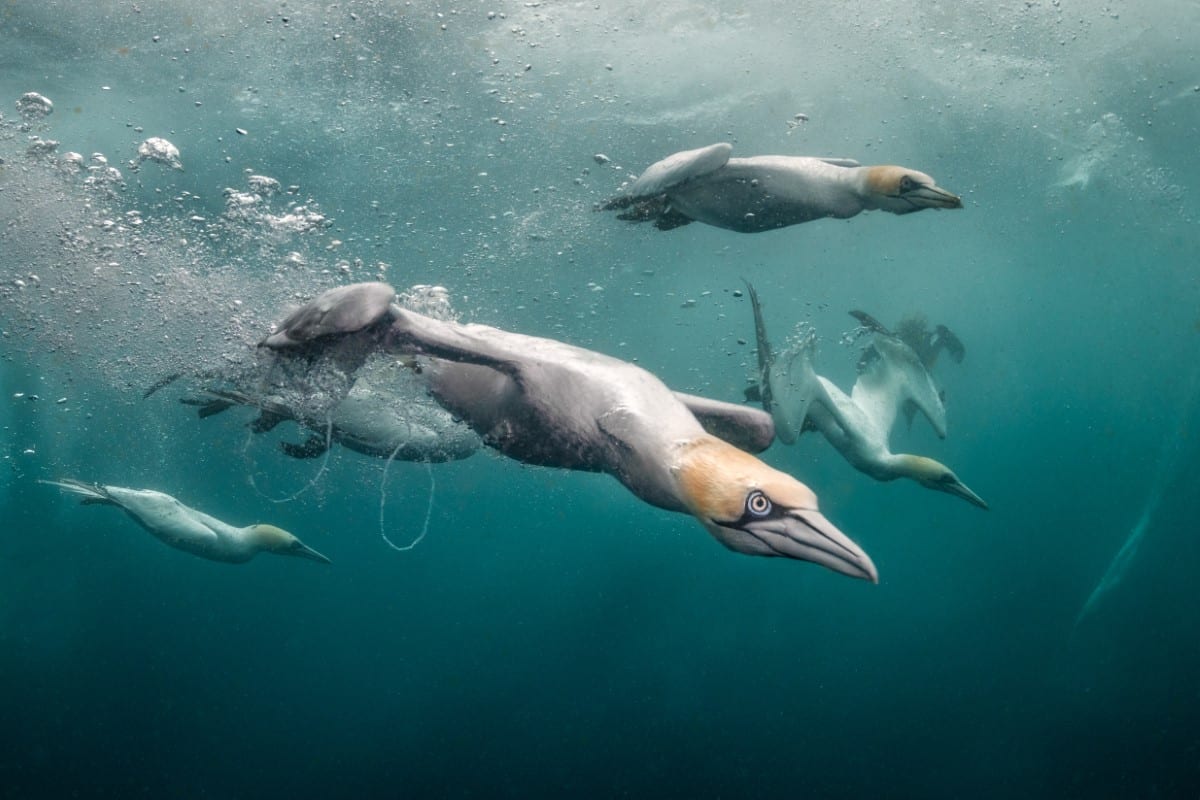
“Divebomb” by Kat Zhou (United States). Winner British Waters Wide Angle Category
“I took this photo during a trip to dive with Northern Gannets in Shetland. The experience of being amidst dive-bombing gannets is both chaotic and adrenaline-fueled, and it was hard to choose where to aim my camera! I tried to photograph any bird that zoomed by, and I was pleasantly surprised when I later saw how this shot was able to depict the dynamic motion of the experience.”
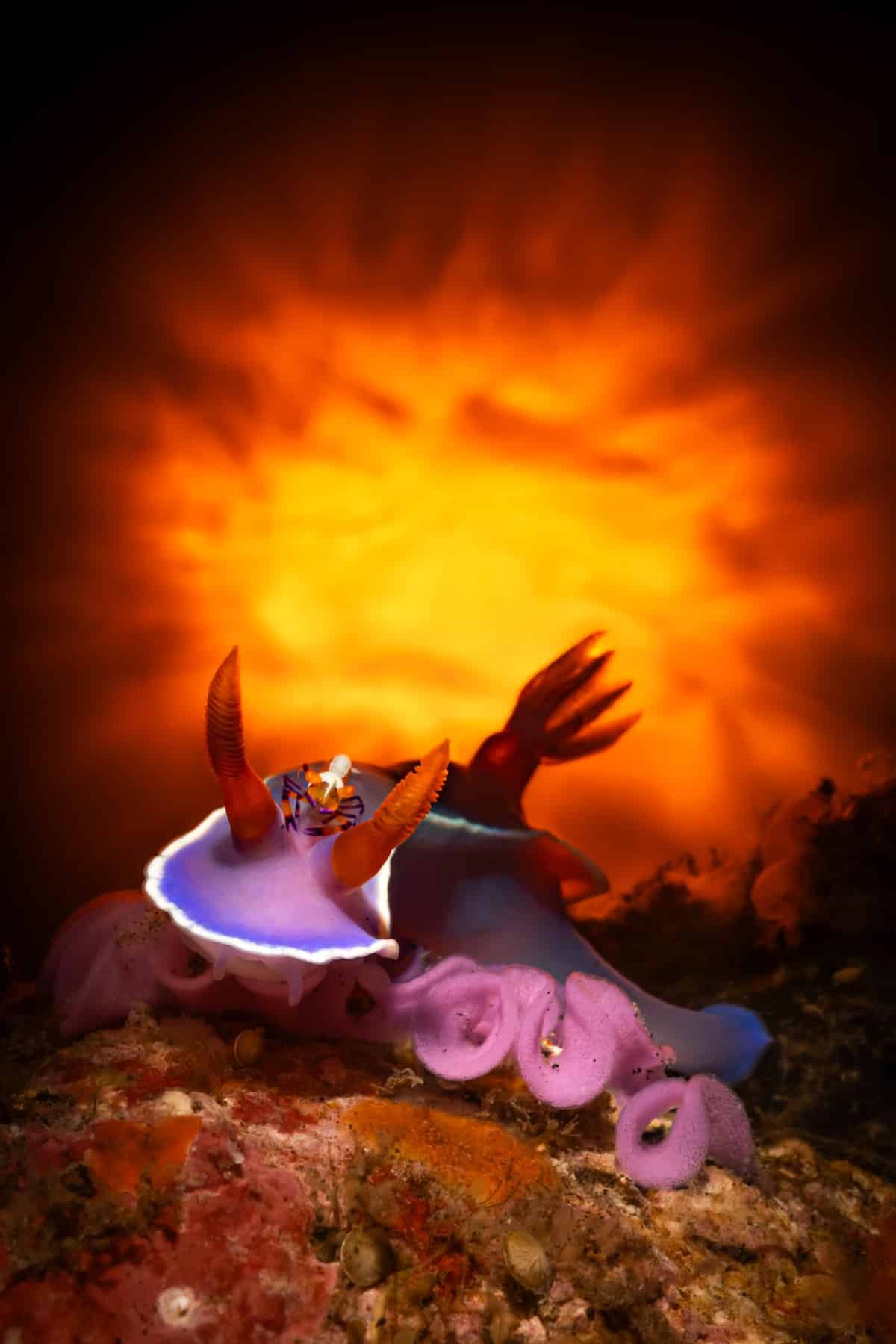
“Nudi on Fire” by Enrico Somogyi (Germany). Winner Compact
“This picture of a nudibranch (Hypsolodoris apolegma) with an emperor shrimp on the head was taken in Tulamben. To create the fire-like background I built a special tool which took me a long time to get it to work. But in the end, I got the picture I was looking for.”
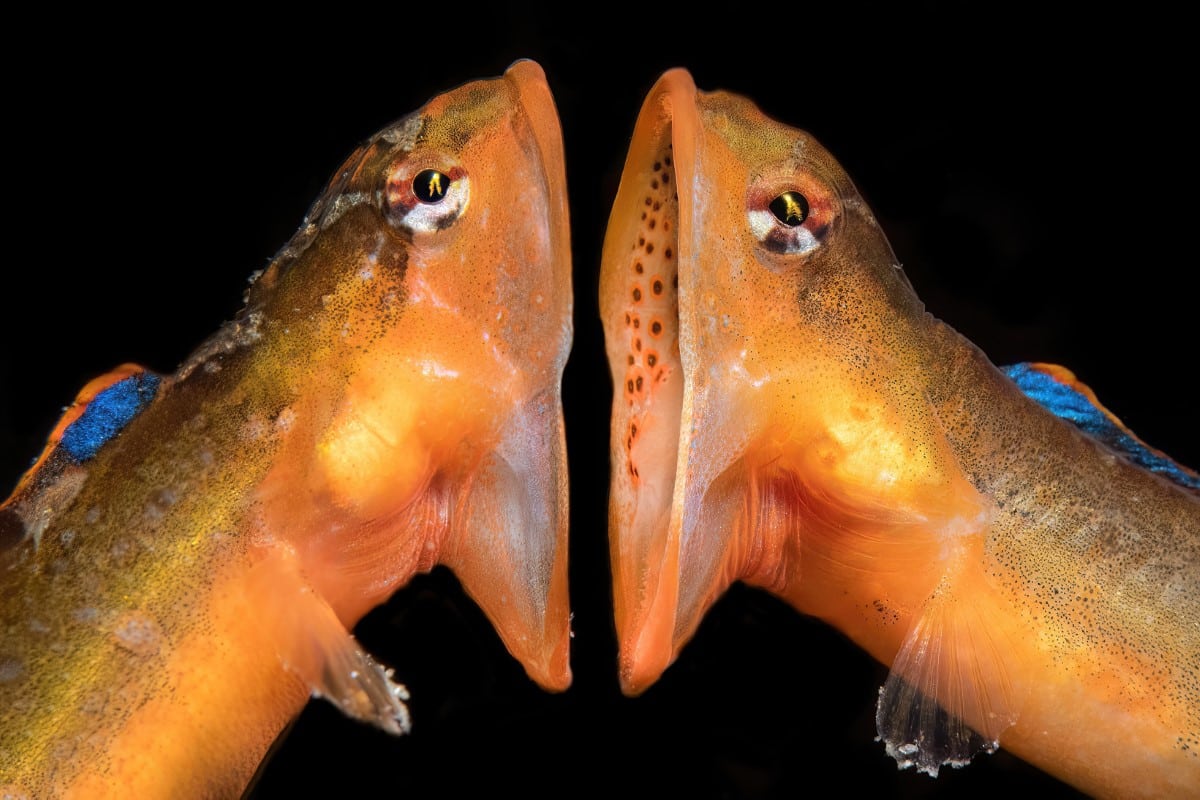
“Mouth To Mouth” vy JingGong Zhang (China). Runner-up Behavior Category
“This is a photo of two female Zoarchias major eelpouts in a fight. During the breeding season, in order to fight for a suitable spawning nest, not only the males will fight each other, but also the females, and inexplicably, even the males and females will sometimes fight each other. Usually, they can only be found in very few places in southern Japan. I thought long and hard before shooting how to perfectly present their two biggest characteristics in the shot: their unique spotted pattern inside the mouth and that the mouth can open up to 180 degrees! My choice was to shoot the fight in its most intense moment, using a snooted strobe to create the black background. I’m very honored to share this charming moment.”
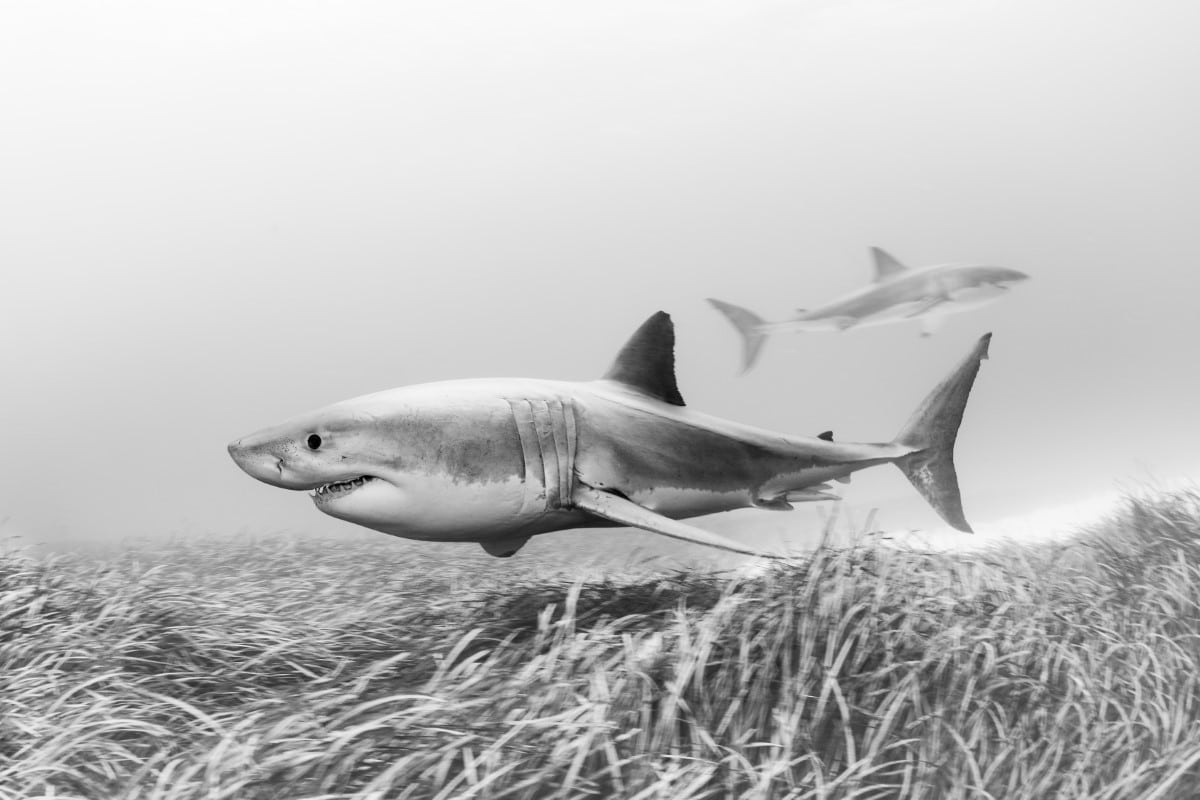
“Two Great White Sharks cruising over seagrass beds” by Matty Smith (Australia). Runner-up Black and White Category
“The conditions were perfect on this day at South Neptune Island. We had a dozen sharks swimming under the MV Rodney Fox with a visibility of 30m+. The weather was calm and sunny, and the ocean was mirror-like. Using a slow shutter, full power strobes, and a panning technique, I was able to freeze the movement of the closest shark whilst portraying the gentle movement and atmosphere of the scene in the seagrass.”
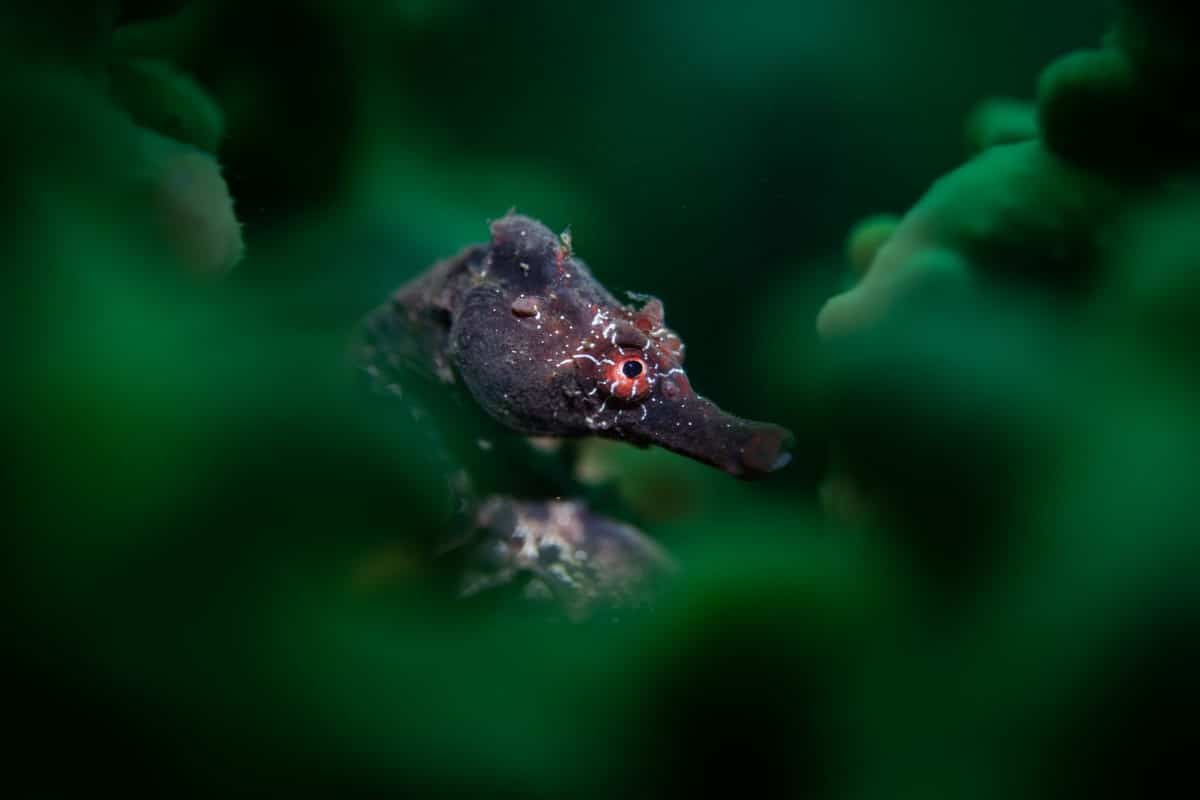
“An Abstract Portrait of a Potbelly Seahorse” by Talia Greis (Australia). Winner Macro Category
“I was drawn to this particular seahorse because it had especially distinguished markings around the eye, and the jaw-dropping color palette made a striking contrast with the surrounding coral. Whilst seahorses are not rare on Sydney dive sites, photographing one that can really stand out has always been a dream for me. I chose to open the aperture all the way down to f/3.5, which transformed the coral into an out-of-focus cloud-like effect but also embraced the ominous green waters of Sydney summer diving. To me, the seahorse’s striking red eye and posture convey power and strength, arising from the smoky underbelly of the ocean.”
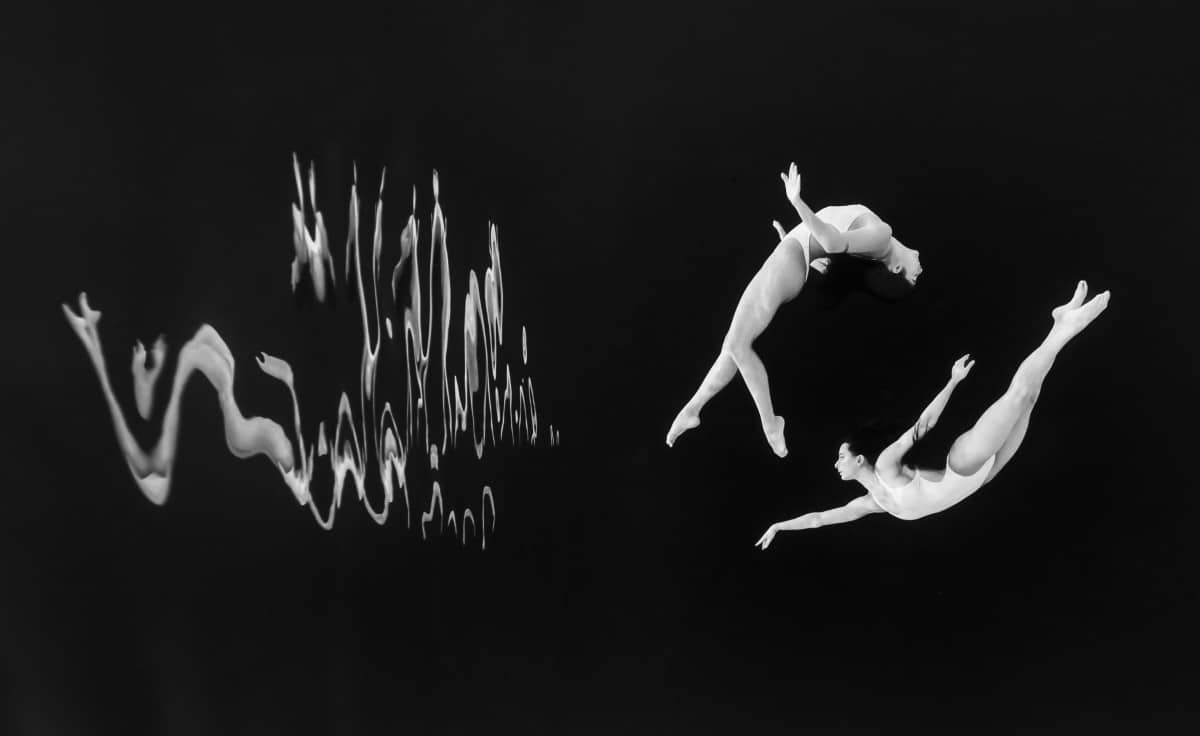
“Water Dancers” by Jasmine Skye Smith (Australia). Winner Black and White Category
“This image was from a creative shoot from my first underwater portrait exhibition, “Underneath” (held in August 2023). I challenged myself to be outside of my comfort zone and push myself creatively. I approached some girls from the synchronized swimming team to do a shoot, and I booked the heated dive pool as it was our winter. I was expecting to be using the 3m depth side, but at the last minute, they said we would be using the 5m end, which was amazing to play with in such a controlled environment- but also came with the challenge of a slanted edge down the bottom which proved very difficult to keep my black backdrop in place with my usual weights. The two 6x3m backdrops only held in place for a few minutes before coming apart -and this was one of the magical captures in that short window.”
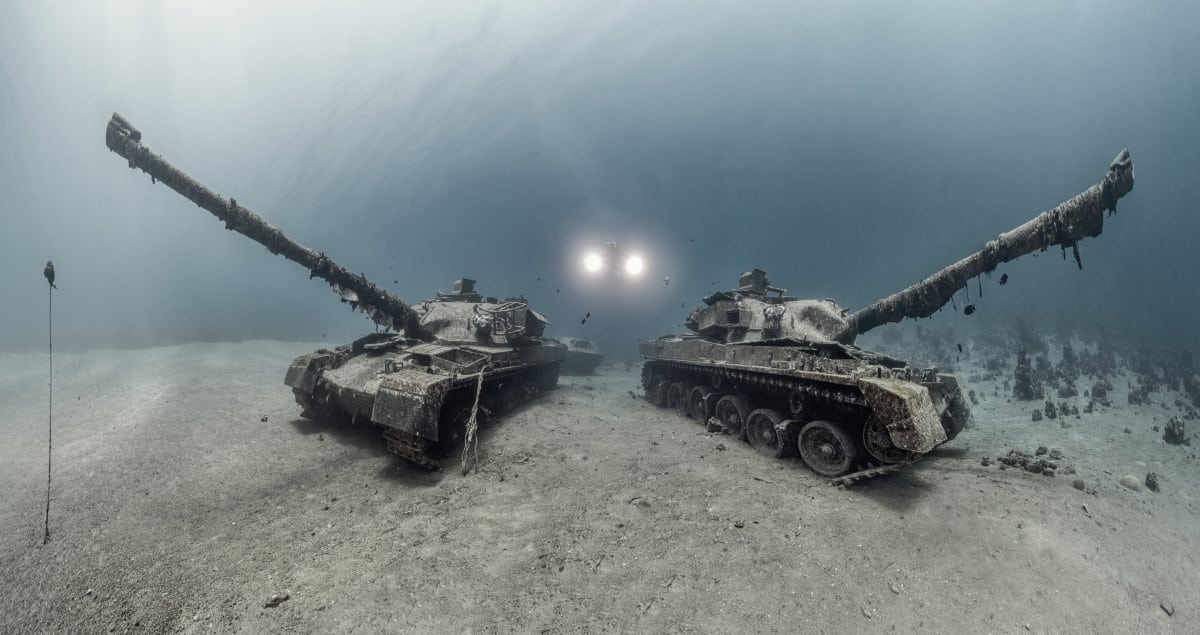
“Chieftain Tanks” by Martin Broen (United States). Winner Wrecks Category
“Together with an amazing group of photographers I had the honor to be invited to compete in the 1st Aqaba underwater photo competition in Jordan, where a highlight is the underwater military museum. An unusual sight of war machines sunk in 15 to 28 meters of water and stationed along the reefs in tactical battle formation.
I wanted to capture the symmetry of the Chieftain Tanks and the strong presence of their 120mm guns, but the position where I could shoot that image with my fish-eye lens was occupied by a military ambulance. Therefore, I experimented with a 6-shot panorama from a point between the guns, which allowed me to recreate the virtual position further back and achieve an elegant symmetry of the tanks, supported by the central focal point of my dive buddy in the back.”
